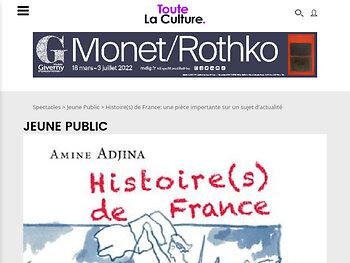What is the history of France? What is the history of France? What do we remember from the history of France? It is through a superb play that we ask ourselves the question, Histoire(s) de France by Amine Adjina, is currently playing at the 13/library theater on the side of the National Library.
The characters are children, they are looking for a subject for their history lesson, they will find three. Alésia, the 1789 revolution and the final of the 98 World Cup. In order to answer three questions which are: Who is the History of France? What is the History of France? And what is the use of the History of France?
On the stage a unique decor with this white horse painted on the wall which is reminiscent of Henri IV, these sheets which recall the facades of housing estates. Arthur, Ibrahim and Camille find themselves there on stage. Their goal is to come up with a topic for the history lesson. Amine Adjina's play questions us. Between his exploration of the founding myths of our nation and his attempts to reclaim their codes. History is a playground that everyone appropriates, that's one of the things we remember here. The history of France is a highly political subject by the vision given to it. Instead of trying to shove this subject under the rug, the play claims it because, as Camille says, “History is for dreaming of a better future”.

Thus for an hour and a half, the actors Mathias Bentahar in the role of Ibrahim, Romain Dutheil in that of Arthur and finally Émilie Prévosteau in that of Camille. They offer us a show, funny but also political, because it is important to know where we come from to know where we are going. We laugh and above all, we understand how the vision of history is of paramount importance to understand the world around us.
During the play, we witness images of a micro sidewalk on the perception of Parisians of the Gauls. Which offers us a good sample of the vision of the vision of the French on Gaul on its supposed ancestors. We understand then that each choice of subjects is not made at random. It's in the moments between choosing the scenes that the play is at its best. When they explain why this choice, what it implies for them. When Ibrahim explains why the choice of Alésia “We are undisciplined, the more I discover the history of the Gauls, the more it is mine that I find. Ibrahim being of Moroccan origin, we understand this need to link his history to that of the country where he lives. But how to do it? This is one of the doors opened by the room.
“Many of us recognize ourselves more in the French team than in the National Assembly.”
That’s kind of the spirit of the play, knowing what France is of today, how a story several thousand years old can speak to young people and to those who do not recognize themselves in it. A story that is sometimes violent, sometimes sad but sometimes joyful too. It is a super well-written piece in the treatment of its subject, classic in the rest, which is aimed at young and old. Theater not to be missed.
Practical information
venue Theater library 13 Paris
Stop line 14 library Francis Mitterrand.
Price
Photo credit: show poster








